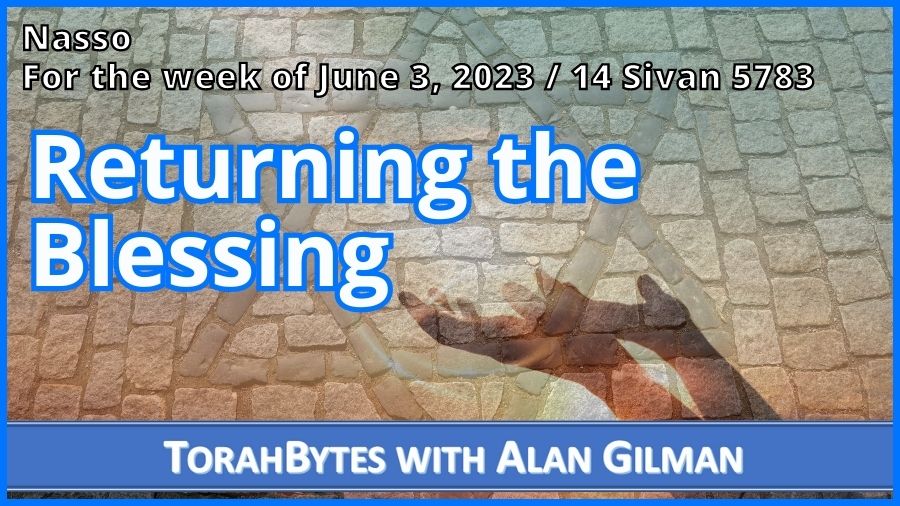For the week of June 3, 2023 / 14 Sivan 5783

Nasso
Torah: B’midbar/Numbers 4:21 – 7:89
Haftarah: Shoftim/Judges 13:2-25
The LORD spoke to Moses, saying, “Speak to Aaron and his sons, saying, Thus you shall bless the people of Israel: you shall say to them, the LORD bless you and keep you; the LORD make his face to shine upon you and be gracious to you; the LORD lift up his countenance upon you and give you peace. So shall they put my name upon the people of Israel, and I will bless them.” (B’midbar/Numbers 6:22-27)
You may be aware of the recent three-week initiative to pray for Israel. At the beginning of this time, my wife and I, both Jewish believers, were in a small prayer group (the others aren’t Jewish). We were praying for Israel. We have rarely been in the presence of such precious prayers. One of the people had it on his heart to pray the priestly blessing from B’midbar/Numbers chapter six, which is part of this week’s parsha (weekly Torah portion), over the Jewish people.
You may or may not be aware how common it is for Christian leaders to recite this blessing, usually at the end of a service, over their congregations. The words are wonderful. The sentiment is great. It is certainly a blessing! You might remember the musical rendition of these ancient words around the beginning of COVID. It warmed my heart to hear God’s word through Moses sung over and over again in a multitude of languages by the peoples of the world amidst the fear that had gripped so many.
Let me try to unpack why I was so touched by the blessing being prayed over our people that Sunday evening. First, in my experience, most people who call themselves Christians see themselves as the new or true Israel. Whatever their personal feelings might be toward Jewish people, there is a tendency to view us as having been God’s chosen people at one time, but with the coming of the Messiah, that identity was transferred to the community of Yeshua followers, the “Church” in other words. This idea is technically termed, “supersessionism,” or more popularly “replacement theology.” Yet, even among those Christians who claim to reject such an idea and accept God’s ongoing faithfulness to the Jewish people, there is still a tendency to directly apply elements of Scripture that were particularly given to the people Israel to themselves. In many cases, perhaps most, I believe this is legitimate, at least to some extent. Let me explain.
Through the Jewish Messiah, the peoples of the nations have the opportunity to have a personal relationship with the one true God, the God of Israel. While there are ongoing distinctives between Jews and Gentiles, the way that non-Jews learn the truth of God and life is via sacred writings that are fundamentally Jewish. All people, Jews and Gentiles, learn about trusting God through Abraham’s willingness to follow God into the unknown. We learn to pray through David’s psalms. We understand God’s faithfulness through his commitment to the people of Israel. And on it goes.
While it is, as I said, legitimate for non-Jews to apply Scriptural truth to themselves, it is tragic that it is often done without ever acknowledging its original context or how it has come about that Jewish Scriptures can become God’s Word for all or the Jewish Messiah can be anyone’s Messiah. The result is the replacement theology I referred to earlier that regards the Church as the new or true Israel even among those who deny such an idea.
With all this in mind, let’s return to the Sunday evening prayer time. Against the backdrop of layers and layers of historic misrepresentation of and arrogance toward Jewish people; a precious and powerful blessing which has been appropriated by the Church unto itself for two thousand years was being returned to its rightful place as this precious man prayed for God’s favor to once more be poured out upon Israel.
You might think, “So what?” What difference does such a sentiment make? It’s because this gesture functions as a symbol of what I believe is the general change of direction that must occur among our non-Jewish fellow Messiah followers. One day we might realize the untold damage the Church has done both to itself and to the Jewish people for not heeding Paul’s words from Romans, chapter eleven, “do not be arrogant toward the branches. If you are, remember it is not you who support the root, but the root that supports you” (Romans 11:18).
It is time for the Church worldwide of every tradition to acknowledge, not only the primacy of Israel in the plans and purposes of God, but his ongoing faithfulness to Israel despite our spiritual condition. Great blessing has come to the Gentiles through, not only the Jewish Messiah, but through those early Jewish believers, who broke through unimaginable barriers to bring God’s blessing to the nations.
God’s heart of love and concern for the Jewish people has never changed. Therefore, let those among the nations who have been richly blessed by the God of Israel in the name of the Jewish Messiah rise up and declare to the people of Israel, “the Lord bless you and keep you!”
Scriptures taken from the English Standard Version
Shalom Alan Well said. As a pastor who for many years did not see the scriptures through Jewish eyes, it is time Gentile believers see the importance of Israel. The Bible was written through Jewish thought and the Holy Spirit.
Since schooling for the past couple of years with Israel Institute of Biblical Studies my eyes have been opened to scripture in ways I could never imagine… Thank you for your ministry